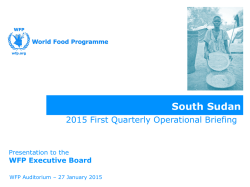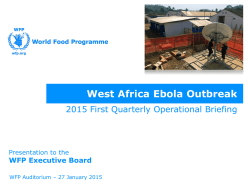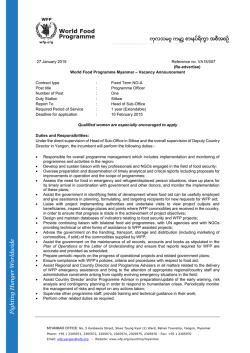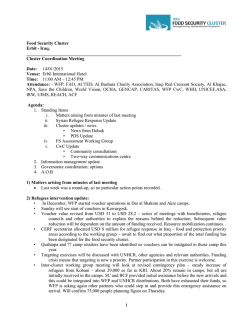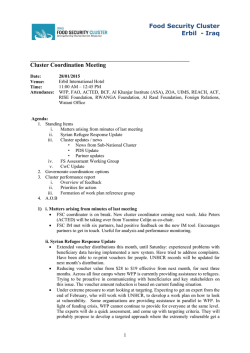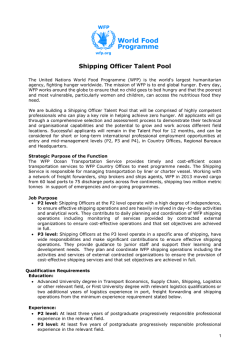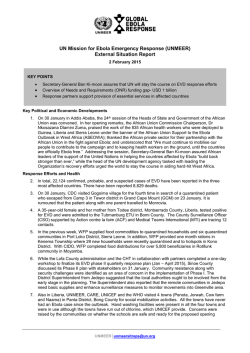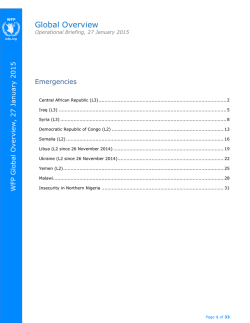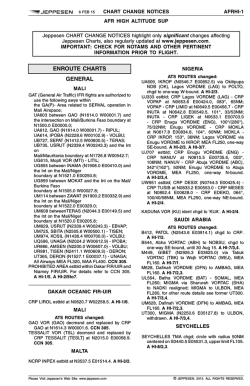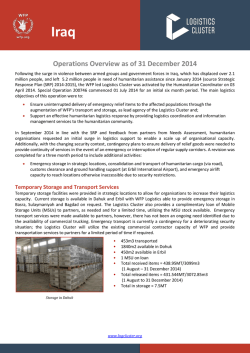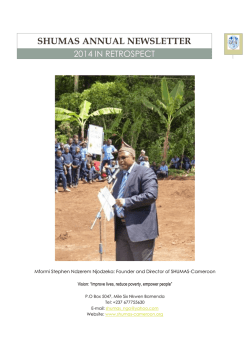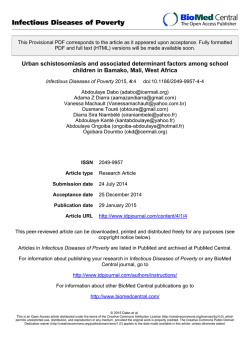
Mali and the Sahel - WFP Remote Access Secure Services
Insert Mali/Sahel specific picture Mali and the Sahel 2015 First Quarterly Operational Briefing Presentation to the WFP Executive Board WFP Auditorium – 27 January 2015 Humanitarian Situation Mali • Nearly 2 million people are estimated to be at risk of food insecurity. • 13.3 percent of children under five suffer from global acute malnutrition (GAM), of whom 2.9 percent suffer from severe acute malnutrition (SAM). • In Northern Mali, high instability is preventing the restoration of essential services; there are still 90,000 IDPs in Mali and 150,000 refugees in neighbouring countries. SITUATIONAL UPDATE Sahel • In December 2014, 19.8 million people in the Sahel are estimated to be food insecure, with at least 2.6 million requiring urgent food assistance. Millions more are expected to see their food security deteriorate during the 2015 lean season. • Acute malnutrition persists in the Sahel at unacceptably high levels. On average, one out of three children in the Sahel suffers from stunting. • Projections indicate that in 2015, 5.8 million children under five will suffer from GAM. 1.4 million will suffer from SAM and 4.4 million from moderate acute malnutrition (MAM). • Floods, droughts and pests remain recurrent shocks for thousands of households. Poor and erratic rainfall, in particular in the western Sahel, has negatively affected yearly harvests and the livelihoods of millions. • Across the Sahel, insecurity and conflict have displaced 2.8 million people, a dramatic increase from 1.6 million in January 2014. • Spiralling violence in north-eastern Nigeria and C.A.R. continues to force people from their homes. Security Situation Mali • The security situation for 2015 remains concerning, sensitive and unpredictable. • Security incidents in northern Mali, including improvised explosive devices and mine explosions on roads, banditry, terrorism and clashes between armed groups continue to affect WFP and partner operations by limiting humanitarian access. The situation may further be destabilized following recent unrest and MINUSMA engaging more actively against attacks. SITUATIONAL UPDATE Sahel • Insecurity has been affecting north-eastern Nigeria and the Central African Republic, and has led to increased displacement both within and outside of these countries. • A regionalization of the conflict in north-eastern Nigeria has taken place, with the increased involvement of militaries from different countries, including Niger who deployed troops to Cameroon in response to Boko Haram attacks. • The intensification of the conflict in Libya is a factor of instability in the region; porous borders and the regional Islamist threat risk further destabilizing the Sahel region. • Recent civil unrest marked by violence and large scale riots took place across the Sahel, particularly in Niger following the last issue of Charlie Hebdo after the terrorist attacks in Paris. Framework of Interventions Mali: PRRO 200719 Saving lives, reducing malnutrition and rebuilding livelihoods (01 January 2015 – 31 December 2017). SO 200802 Provision of Common Humanitarian Air Service (01 January 2015 – 31 December 2015). Burkina Faso, Mauritania and Niger: Sahel: LICK TO EDIT SUBTITLE PROGRAMMING Regional EMOP 200438 Assistance to refugees and internally displaced persons affected by insecurity in Mali (01 June 2012 – 31 December 2015). WFP operates under PRROs and EMOPs to provide life saving food assistance, reduce malnutrition, rebuild livelihoods and strengthen community resilience to renewed shocks in Burkina Faso, Cameroon, Chad, Mali, Mauritania, Niger, Senegal and the Gambia. Activities Continue to link crisis response and reducing risk & vulnerability to shocks, breaking the cycle of hunger and achieving sustainable food security and nutrition while protecting vulnerable populations. LICK TO EDIT SUBTITLE Mali PRRO 200719 • 1.1 million food-insecure people targeted annually throughout Mali; • respond to the immediate food security and nutrition needs of IDPs and returnees, protecting people affected by disasters and seasonal stresses; • support the recovery and stability of communities affected by shocks; • prevent and treat moderately malnourished children under 5 and pregnant and lactating women (BSFP + TSFP); and • provide a safety net for vulnerable primary schoolchildren. PROGRAMMING Mali SO 200802 • provide safe and reliable air transport services to the humanitarian community in Mali in 2015. Regional EMOP 200438 (extended until end 2015) • 123,000 refugees whofled conflict in northern Mali since 2012 are targeted. • general food distribution through in-kind food and cash/voucher transfers; • prevention and treatment of moderate acute malnutrition among children and pregnant and lactating women through blanket supplementary feeding and targeted supplementary feeding; and • emergency school feeding. Operational Priorities Ensure a coherent and integrated approach to building resilience and breaking the inter-generational cycle of hunger and malnutrition among the poorest and most vulnerable populations in the Sahel. Mali • • scale-up of activities to cover additional caseloads in March and April in anticipation of the early and severe lean season. Continue to advocate for humanitarian access and for the facilitation of the resumption of economic activities and commercial imports in the North of the country. Continue to closely coordinate with key Partners and the Government to ensure synergy of interventions. PROGRAMMING Sahel • • • LICK TO EDIT SUBTITLE • stabilize the nutritional situation of refugees, including women and children. Cater for increasing needs arising from the insecurity in neighbouring countries. Pre-position sufficient commodities throughout the Sahel countries, especially in remote and insecure areas, to avoid breaks and a potential acute humanitarian crisis. Monitoring • WFP will contribute to a Food and Nutrition Security Assessment in Mali which will begin in early February and inform the humanitarian response during the agricultural lean season (June-September). • In the north of Mali, where the UN has limited access, WFP continues to conduct third-party monitoring through a national NGO partner to collect food security, household, nutrition and market information. • In collaboration with UNHCR, WFP continues to identify refugees and undertake biometric registration in all three countries. • WFP is launching a mobile Vulnerability Assessment (mVAM) project to facilitate data collection using mobile phones in Niger. • Across the Sahel, price monitoring systems for basic food products aims to monitor market situations and ensure that WFP's interventions do not disrupt local markets. LICK TO EDIT SUBTITLE PROGRAMMING WFP operations in Mali and the Sahel are targeted based on assessment and monitoring data to ensure an efficient and effective response. Where possible WFP field monitors ensure regular follow up of activities while cooperating partners provide monthly activity and distribution reports. Joint monitoring/ assessment missions are carried out periodically. Operational Requirements NEEDs (USD) PLANNED BENEFICIARIES RECEIVED SHORTFALLS Mali PRRO 200719 310,406,569 2.6 million 28,765,982 281,640,587 Mali SO 200802 5,887,231 NA 1,666,389 4,220,842 Regional EMOP 200438 200,162,000 123,000 110,233,235 89,928,765 RESOURCING Mali PRRO 200719 % received % shortfall LICK TO EDIT SUBTITLE PROJECT Mali SO 200802 % received % shortfall (USD) (USD) Regional EMOP 200438 % received % shortfall Resourcing shortfalls and constraints Mali PRRO • As WFP aims to scale up lifesaving activities to vulnerable groups during the pastoral lean season, serious pipeline breaks in cereals and nutrition products are imminent. WFP urgently requires US$35 million to reach people affected by violence and food insecurity across the country. • Securing funds early on for this new operation will allow WFP to preposition sufficient commodities in country, especially in remote and insecure areas in the North, to avoid breaks. LICK TO EDIT SUBTITLE RESOURCING Mali SO • The 2015 operational plan and budget requirements were presented to users in December 2014. Critical financial shortfalls expected in 2015 may limit WFP’s capacity to maintain operations. Regional EMOP • WFP requires US$16 million over the next six months to support Malian refugees in Burkina Faso, Mauritania and Niger. The EMOP faces immediate shortfalls, which will have a drastic impact on stabilizing the nutrition situation of refugees, including women and children. Implementing Capacity Staff Mauritania CAPACITY Niger Cooperating Partners 7 14 50 90 5 2 16 3 18 4 6 75 60 (202 national and 44 international) (77 national and 13 international) Burkina Faso Warehouses 246 72 (64 national and 8 international) 243 (207 national and 36 international) LICK TO EDIT SUBTITLE Mali WFP Offices • Insecurity in northern Mali, Niger and Mauritania remains the main constraint to humanitarian access and impacts on the ability of WFP and partners to access beneficiaries and implement activities as planned. • A major deterioration of the context in northern Mali could have repercussion in Mauritania and Niger, and may require the relocation of WFP and partners' staff. • In Mali, some implementing partners have suspended or withdrawn activities, impacting WFP operations. Contingency plans are in place to maintain assistance by increasing the capacity of national and community-based organizations. • Inaccessibility of roads, particularly during the rainy season often affects the delivery of food assistance, forcing WFP to supply and preposition stocks for 3-5 months. • Due to security concerns and risks of looting, partners are often using a “just-intime” supply strategy to organize distributions as soon as food is delivered. • Access to landlocked countries and congestion of main corridors affects lead times. LICK TO EDIT SUBTITLE CAPACITY Capacity & Access Constraints • In Mali, WFP works closely with the relevant Government Ministries and the Commission for Food Security (CSA). WFP also chairs the Food Security and Nutrition PTF sub-working group which has been instrumental in initiating the reform of the National Food Security Framework. • Together with FAO, WFP co-leads the Food Security Cluster in Mali which plays a critical role in supporting food security surveys and in coordinating relief and recovery activities. In Burkina Faso, WFP also coleads the Food Security Cluster. • In Mauritania, under the umbrella of the Ministry of Economic Affairs and Development, WFP coordinates with five key ministries for the implementation of its activities. WFP also takes part in sectorial working groups including food security, nutrition and protection/refugees. • In January 2015, UNHCR signed a tripartite agreement with the Governments of Burkina Faso and Mali to organize the voluntary repatriation of refugees. • Regional EMOP 200438 is coordinated by the WFP Regional Bureau in collaboration with UNHCR and the UN Regional Humanitarian Coordinator. LICK TO EDIT SUBTITLE INTER-AGENCY & CLUSTERS Coordination Critical Risks CONTEXTUAL RISKS: PROGRAMMATIC RISKS: • Engagement of MINUSMA in Northern Mali. • Fragile socio-political situation and frequent unrest across the Sahel (popular insurrection in Burkina, Charlie Hebdo protests, demands for independence). • Impact of the spread of Ebola in the region. RISKS • Reduction in funding levels. INSTITUTIONAL RISKS: • Continued lack of safe humanitarian space in Northern Mali. • Disruption / breakdown of the supply chain (corridors congestion). • Food pipeline breaks. LICK TO EDIT SUBTITLE • Further aggravation of the level of the armed conflict in Mali. • Lack of available and limited partner capacity. • Reduction in WFP’s capacity to monitor and coordinate the operations. • Looting of WFP assets. • Possible deactivation of refugees. • Security risks for staff e.g. kidnapping, terrorist attacks, etc. • Safety and reputational risk linked to perception of neutrality (MINUSMA). • Perception of discrimination in access to food assistance by beneficiaries. • Difficulty to attract qualified staff/mobility of staff in the region. Way forward and Regional Impact • Continue to move to a resilience approach to restore food security and livelihoods. • Enhance operational capacity in remote and insecure areas, and increase number and capacity of national partners throughout the Sahel. • In cooperation with UNHCR, carry on WFP’s support and targeting of refugees through biometric registration in Burkina, Niger and Mauritania. • Ensure Sahel countries are prepared and ready to action contingency plans in the event of Ebola spread. • Adapt to the new security paradigm in the Sahel and West Africa. LICK TO EDIT SUBTITLE REGIONAL IMPACT WAY FORWARD • Combine life-saving nutritional activities with long term actions through multisectoral approaches that address the underlying causes of malnutrition. REGIONAL IMPACT • Clashes in Northern Mali and Nigeria may trigger new population movements. • Possible expansion/spill-over effect of the insecurity in northern Mali, Niger, C.A.R. and Nigeria into neighboring countries. • Further reductions of humanitarian access and corridors. Nigeria Regional EMOP • Regional Emergency Operation 200777 “Providing life-saving support to households in Cameroon, Chad and Niger directly affected by insecurity in northern Nigeria” was launched in January 2015. • The influx of refugees, returnees, and internally displaced persons is putting strain on already stretched environmental resources and basic services across Cameroon, Chad and Niger. • The EMOP aims to support 238,000 beneficiaries over 12 months through food transfers, commodity vouchers and conditional food assistance for assets activities. • Target groups include: refugees (Cameroon, Chad and Niger), returnees (Niger), and internally displaced persons (Cameroon). In all three countries, poor and very poor local populations whose access to food has been aggravated as a direct result of the crisis will also receive targeted assistance. • According to UNHCR’s latest reports, there are currently some 153,000 people who have been registered as arriving in Cameroon (37,000), Chad (16,000) and Niger (100,000). • Continued attacks by Boko Haram in the north-east of the country are leading to more movement and displacement of Nigerians to Niger and Cameroon. LICK TO EDIT SUBTITLE REGIONAL IMPACT Support to Nigerian refugees in Cameroon, Chad and Niger C.A.R Regional EMOP • Regional Emergency Operation 200799 “Critical support to populations affected by the ongoing crisis in C.A.R. and its regional impact” was launched in January 2015. • It spans five countries (C.A.R., Cameroon, Chad, DRC and RoC) and consolidates earlier country-specific responses to this prolonged crisis in response to another wave of insecurity in C.A.R. • The EMOP aims to reach 1.5 million beneficiaries over 12 months, increasing coherence in objectives and programmes, while adapting to the particular context and needs of beneficiary groups. The regional lens also allows for a broader view of supply chain management, recognizing common challenges, but also cross-border opportunities for movement of goods. • According to UNHCR, C.A.R. refugee numbers are as follows: 242,000 in Cameroon; 93,000 in Chad; 68,000 in DRC; and 22,000 in RoC. It is estimated that there are 437,000 IDPs in C.A.R. • The hostilities in the country might lead to new displaced persons and movement of populations across the borders. LICK TO EDIT SUBTITLE REGIONAL IMPACT Support to IDPs in C.A.R. and C.A.R. refugees in neighbouring countries Libya North Mali 2 * * M N Niger NW Niger Sudan E Niger 1 3 G * SL L EVD Ebola North Nigeria N Chad W Chad S Chad N Cameroon * NE Camero on 4 CAR * DRC
© Copyright 2026
